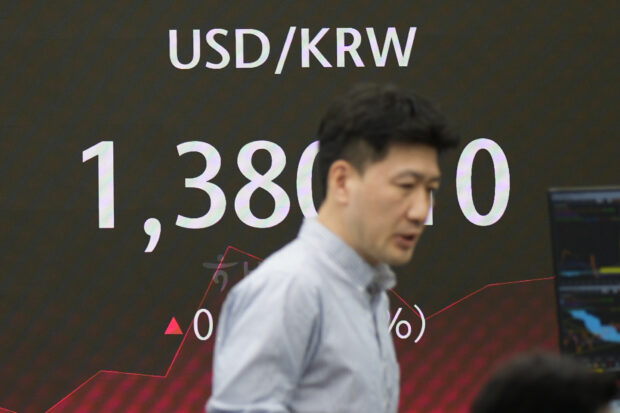
A currency trader walks by the screen showing the foreign exchange rate between U.S. dollar and South Korean won at a foreign exchange dealing room in Seoul, South Korea, Friday, May 31, 2024. (AP Photo/Lee Jin-man)
Asian shares were higher on Friday as investors shrugged off yet another decline on Wall Street, while an official survey showed a weakening in Chinese factory activity.
Tokyo’s Nikkei 225 added 1.2 percent to 38,119.96 as reports circulated of plans for major investments by government-backed pension funds and other big institutional investors.
The Nikkei financial news outlet said Japan is preparing to put nearly 100 trillion yen ($638 billion) more public money into the markets, following the lead of the Government Pension Investment Fund.
Chinese shares rose despite the survey showing further pressure on an economy already burdened by a prolonged crisis in the property industry. But negative indicators often fuel speculation that they will lead Beijing to counter with growth-friendly policies.
Hong Kong’s Hang Seng index jumped 1.2 percent to 18,446.05 and the Shanghai Composite index was up 0.3 percent at 3,099.72.
Australia’s S&P/ASX 200 rose 0.5 percent to 7,668.90 and the Kospi in Seoul gained 0.4 percent to 2,646.44
Tech stocks slip
Taiwan’s Taiex dropped 0.9 percent as shares in the market’s biggest heavyweight, computer chip maker Taiwan Semiconductor Manufacturing Corp., fell 2 percent, tracking declines for other major technology companies.
That followed a 3.8 percent drop for Nvidia on Thursday after massive gains driven by Wall Street’s frenzy around artificial intelligence technology.
READ: Nvidia’s Q1 profit soars, underscoring its dominance in chips for AI
Nvidia’s loss helped pull the Nasdaq composite down 1.1 percent, while the S&P 500 sank 0.6 even though the majority of stocks within the index and across Wall Street were higher. The Dow Jones Industrial Average dropped 0.9 percent.
Friday will bring a monthly update on a gauge of inflation that the Federal Reserve prefers to use. The tail end of earnings reporting is another driver for the market. Profits have largely been better than expected for the start of 2024.
Helping to support the market Thursday were better-than-expected profit reports from a range of companies. Best Buy topped forecasts even though its revenue fell short last quarter, and its stock rose 13.4 percent.
Foot Locker ran 15 percent higher after likewise reporting better-than-expected profit despite ringing up sales shy of analysts’ forecasts.
Stocks also broadly got a boost from easing Treasury yields in the bond market, providing relief after they had climbed earlier this week on worries about tepid demand for Treasury bonds following several U.S. government auctions. Higher yields put downward pressure on all kinds of investments.
Yields fell Thursday after a couple of reports showed the U.S. economy isn’t quite as strong as expected.
US economic growth not as strong as thought
One report showed more U.S. workers applied for unemployment benefits last week than expected, though the number of layoffs still remains low compared with history. Another suggested the overall U.S. economy’s growth may not have been quite as strong as earlier thought.
READ: US economic growth in Q1 revised down from 1.6% to 1.3%
A slowdown in the economy could give the Federal Reserve more confidence that inflation is sustainably heading down to its 2 percent target. That in turn could convince it to cut the federal funds rate, which has been sitting at the highest level in more than two decades.
The yield on the 10-year Treasury fell to 4.54 percent from 4.62 percent late Wednesday. The two-year yield, which more closely tracks expectations for Fed action, fell to 4.92 percent from 4.98 percent.
Among other gainers, C3.ai jumped 19.4 percent after the software company topped expectations for both profit and revenue in the latest quarter. HP gained 17 percent after edging past forecasts for earnings.
Many retailers are also reporting, as they usually do to close each earnings season, and scrutiny is high because of worries about whether U.S. households can keep spending. Still-high inflation is hurting them, particularly those making lower incomes.
In other dealings early Friday, U.S. benchmark crude oil lost 28 cents to $77.63 per barrel in electronic trading on the New York Mercantile Exchange. Brent crude oil, the international standard, shed 21 cents to $81.67 per barrel.
The U.S. dollar fell to 156.78 Japanese yen from 156.82 yen. The euro slipped to $1.0822 from $1.0834.